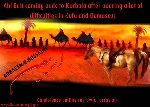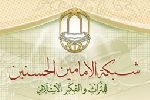Shiism History
The Destiny of Muslim ibne Aqil (A.S.)
- Published at
-
- Author:
- T. Zayn al-'Abidin

The caravan of al-Imam al-Husayn ('alayhi salam) was travelling toward the city of Kufa in Iraq, during the month of Zhul Hijjah 60AH when a messenger came from the direction of Kufa and said :
Anniversary of the destruction of the Jannatul-Baqi by Ale-Saud
- Published at
-
- Source:
- www.duas.org
 The demolition of Jannatul-Baqi on 8 Shawwal,1345AH(April 21,1925) at the hands of Al-e-Saud was a great tragedy in the history of Islam.
The demolition of Jannatul-Baqi on 8 Shawwal,1345AH(April 21,1925) at the hands of Al-e-Saud was a great tragedy in the history of Islam.
The Baqi Tragedy (In Holy Madina)
- Published at
-
- Author:
- Jerrmein Abu Shahba
- Source:
- www.qul.org.au
 As we approach the 86th anniversary of the tragic occasion of the demolition of the holy graves of Baqi in Medina (which took place on the 8th of Shawwal in the year 1345 AH), we are greatly saddened at the injustice.
As we approach the 86th anniversary of the tragic occasion of the demolition of the holy graves of Baqi in Medina (which took place on the 8th of Shawwal in the year 1345 AH), we are greatly saddened at the injustice.
Ashura, the 10th of Muharram
- Published at
-
- Author:
- Muhammad Reza Hakimi
 In the Name of Allah, the most Gracious, the most Merciful
The Religion of Islam was presented to the world and human society Forthrightly; no problem, or issue, which was necessary for of society in order to prosper, was left unsolved by the time the Prophet passed away.
In the Name of Allah, the most Gracious, the most Merciful
The Religion of Islam was presented to the world and human society Forthrightly; no problem, or issue, which was necessary for of society in order to prosper, was left unsolved by the time the Prophet passed away.
The Holy City of Qum
- Published at
-
- Author:
- Masuma Jaffer
- Source:
- www.al-islam.org
 1.1 - Introduction
Qum is the smallest province in Iran. It was previously a district belonging to the state of Arāk, then it was attached to Tehran until it was finally certified as an independent province.
1.1 - Introduction
Qum is the smallest province in Iran. It was previously a district belonging to the state of Arāk, then it was attached to Tehran until it was finally certified as an independent province.
Karbala: A Revolution of Hearts and Minds
- Published at
-
- Author:
- Islamic Insights
 The event of Karbala always evokes strong emotions and deep intellectual thoughts which touch and affect the whole existence of those who seek to find a path through it. But the significance of this event goes much beyond the mere unveiling of the corruption and deviations perpetrated by Banu Umayya. Karbala changed the course of history and continues to inspire all truth-seeking revolutionaries.
The event of Karbala always evokes strong emotions and deep intellectual thoughts which touch and affect the whole existence of those who seek to find a path through it. But the significance of this event goes much beyond the mere unveiling of the corruption and deviations perpetrated by Banu Umayya. Karbala changed the course of history and continues to inspire all truth-seeking revolutionaries.
Karbala: The Everlasting Stand
- Published at
-
- Author:
- aimislam.com
 What you are about to read is a story of a great man whose uprising has no like in the chronicles of history. A revolution with goals most sublime; a victory most profound; and at its core, a pronouncement of reform over conquest. The story of Hussain, the grandson of the Prophet of Islam, and his ‘Everlasting Stand’.
What you are about to read is a story of a great man whose uprising has no like in the chronicles of history. A revolution with goals most sublime; a victory most profound; and at its core, a pronouncement of reform over conquest. The story of Hussain, the grandson of the Prophet of Islam, and his ‘Everlasting Stand’.
Shia in Republic of Azerbaijan
- Published at
-
- Author:
- Majid Kamimi
- Source:
- https://www.academia.edu/35663760/Shia_in_Republic_of_Azerbaijan
 Shia is a fraction of Islam which is now has followers in the Middle East. 10 present of all Muslims are Shia in the world. There are about 154 million Shia mostly they live in the Middle East. There are 3 Shia countries in the world (Iran, Iraq and Azerbaijan) that officially Shia is the dominant religion in there.
Shia is a fraction of Islam which is now has followers in the Middle East. 10 present of all Muslims are Shia in the world. There are about 154 million Shia mostly they live in the Middle East. There are 3 Shia countries in the world (Iran, Iraq and Azerbaijan) that officially Shia is the dominant religion in there.
The Shi‘ah-Populated Places during the Second Century Hijri
- Published at
-
- Author:
- Ghulam-Husayn Muharrami
 At the beginning of the second century AH, Shi‘ism extended beyond the frontiers of the Arabian Peninsula and Iraq as it encompassed the entire Muslim domain. In view of the scattering of the Shi‘ah and ‘Alawis in the Muslim territories, this matter can be discerned. From the time of Hajjaj ibn Yusuf, the migration of the Shi‘ah and ‘Alawis to the other regions had begun.
At the beginning of the second century AH, Shi‘ism extended beyond the frontiers of the Arabian Peninsula and Iraq as it encompassed the entire Muslim domain. In view of the scattering of the Shi‘ah and ‘Alawis in the Muslim territories, this matter can be discerned. From the time of Hajjaj ibn Yusuf, the migration of the Shi‘ah and ‘Alawis to the other regions had begun.
The Defeat of the Tawwabin
- Published at
-
- Author:
- Dr. I.K.A Howard
- Source:
- www.alhassanain.org/english
 Before Sulaymen b. Surad left, Yazid b. al‑Harith b. Yazid b. Ru'aym, one of the Kufan tribal leaders reported the Shi'a activities of both Sulayman b. Surad and al‑Mukhtar to the governor'Abd Allah b. Yazid. He pointed out that al‑Mukhtar did not want to revolt yet, but that Sulayman b. Surad would revolt very soon. He suggested firm action against him. 'Abd Allah b. Yazid preached in the mosque against revolt and said that he would not harm anybody who did not harm him.
Before Sulaymen b. Surad left, Yazid b. al‑Harith b. Yazid b. Ru'aym, one of the Kufan tribal leaders reported the Shi'a activities of both Sulayman b. Surad and al‑Mukhtar to the governor'Abd Allah b. Yazid. He pointed out that al‑Mukhtar did not want to revolt yet, but that Sulayman b. Surad would revolt very soon. He suggested firm action against him. 'Abd Allah b. Yazid preached in the mosque against revolt and said that he would not harm anybody who did not harm him.
Sayyid Razi: Who Collected Nahj al-Balagha
- Published at
-
- Author:
- Ayatullah Ali Dawani, Translated by: Sayyid Athar Husain S.H. Rizvi
- Source:
- Ansariyan Publications – Qum
 Doubtlessly, Sayyid Razi is the most famed Shia scholar and he possessed an enlightened disposition and was a high caliber intellectual. He is the luminous star that shone on the skies of Baghdad, which had always been the center of the world of knowledge in every age. This brilliant scholar was born in 359 A.H. in the city of Baghdad.
Doubtlessly, Sayyid Razi is the most famed Shia scholar and he possessed an enlightened disposition and was a high caliber intellectual. He is the luminous star that shone on the skies of Baghdad, which had always been the center of the world of knowledge in every age. This brilliant scholar was born in 359 A.H. in the city of Baghdad.
Who are the Shi‘a?
- Published at
-
- Author:
- Sayyid Moustafa Al-Qazwini
- Source:
- www.al-islam.org
 The fifth imam of the school of the Ahlul Bayt, Imam Muhammad al-Baqir once told his student by the name of Jabir, “Is it enough for a person to embellish himself as our Shi‘a (follower) by professing love for us, the Ahlul Bayt? Nay! By Allah, a person is not our follower unless he fears Allah and obeys Him. Our followers are only recognized, O Jabir, by their humility, submission, honesty, abundant praise of Allah, fasting, prayers, goodness to their parents, attention to the poor, needy, debtors, and orphans living nearby, speaking of the truth, recitation of the Qur’an, holding back their tongues except for good words, and trustworthiness towards one’s relatives in all affairs.”
The fifth imam of the school of the Ahlul Bayt, Imam Muhammad al-Baqir once told his student by the name of Jabir, “Is it enough for a person to embellish himself as our Shi‘a (follower) by professing love for us, the Ahlul Bayt? Nay! By Allah, a person is not our follower unless he fears Allah and obeys Him. Our followers are only recognized, O Jabir, by their humility, submission, honesty, abundant praise of Allah, fasting, prayers, goodness to their parents, attention to the poor, needy, debtors, and orphans living nearby, speaking of the truth, recitation of the Qur’an, holding back their tongues except for good words, and trustworthiness towards one’s relatives in all affairs.”
The Holy Shrines at Kadhmayn
- Published at
-
- Author:
- Imam Reza Network
- Source:
- Encyclopaedia of Islam, art. "Kadhmayn"
 Anyone approaching Baghdad from the north or the west will be impressed by the sight of the four golden minarets at Kadhmayn, the Shrine of the Two Imams, Imam Musa al-Kadhim and Imam Muhammad Taqi al-Jawad, peace be upon them. They are respectively the Seventh and the Ninth of the Twelve Imams, at whose tombs we are accustomed to seek healing and to invoke their intercession for the forgiveness of our sins and the fulfilment of our needs.
Anyone approaching Baghdad from the north or the west will be impressed by the sight of the four golden minarets at Kadhmayn, the Shrine of the Two Imams, Imam Musa al-Kadhim and Imam Muhammad Taqi al-Jawad, peace be upon them. They are respectively the Seventh and the Ninth of the Twelve Imams, at whose tombs we are accustomed to seek healing and to invoke their intercession for the forgiveness of our sins and the fulfilment of our needs.
Spread of Tashayyu' and Beginning of Shi'ite Historiography during the Safawid Era
- Published at
-
- Author:
- Rasul Ja'fariyan
 It should be noted that during the Safawid period, part of the historiography is related to the recording of historical developments of the Safawid State. We do not intend to describe such compilations whose outstanding examples are the different 'Alam Ara-s [1] and the Khula-sah al-Tawa-ri-kh. We only intend to point out those historical books that exclusively deal with the history of the advent of Islam, such as the biography of Prophet Muhammad (S) and the accounts of the life of the Imams ('a).
It should be noted that during the Safawid period, part of the historiography is related to the recording of historical developments of the Safawid State. We do not intend to describe such compilations whose outstanding examples are the different 'Alam Ara-s [1] and the Khula-sah al-Tawa-ri-kh. We only intend to point out those historical books that exclusively deal with the history of the advent of Islam, such as the biography of Prophet Muhammad (S) and the accounts of the life of the Imams ('a).
Shaykh Tusi: Father of Shia Jurisprudence
- Published at
-
- Author:
- Ayatullah Ali Dawani, Translated by: Sayyid Athar Husain S.H. Rizvi
- Source:
- Ansariyan Publications – Qum
 Muhammad ibn Tusi, famous as Shaykh Tusi is the most well known jurist and Mujtahid of the Shias who lived during the first half of the 5th century A.H. He was originally an inhabitant of Tus and was born there in 385 A.H. He received primary education in his homeland of Iran and after that he moved to Baghdad for higher studies.
Muhammad ibn Tusi, famous as Shaykh Tusi is the most well known jurist and Mujtahid of the Shias who lived during the first half of the 5th century A.H. He was originally an inhabitant of Tus and was born there in 385 A.H. He received primary education in his homeland of Iran and after that he moved to Baghdad for higher studies.
The Ummah Fractures after Holy Prophet
- Published at
-
- Author:
- Sayyid Moustafa Al-Qazwini
- Source:
- When Power and Piety Collide (www.al-islam.org)
 فَتَقَطَّعُوا أَمْرَهُم بَيْنَهُمْ زُبُرًا كُلُّ حِزْبٍ بِمَا لَدَيْهِمْ فَرِحُونَ
But people have cut off their affair (of unity), between them into sects: each party rejoices in that which is with itself. (Holy Qur’an, 23:53)
The tumult of the Quraysh group could not leave the Muslim ummah unscathed. Although the popular viewpoint today is that Islam has maintained two sects—Sunni and Shi’a, but the fact of the matter is that virtually hundreds of Muslim religious sects came and went in the past.
Nonetheless, the fracture, which has grown into the two main paths (Sunni and Shi’a) cannot be neglected. Many bystanders view the Shi’a aspect of Islam as a deviation from the norm and a split from the “original Islam” because the Shi’a are a minority. However, the Shi’a maintain that their path is actually the original and unaltered version of Islam as taught by the Prophet, and verified and secured by his family (Ahlul Bayt).
فَتَقَطَّعُوا أَمْرَهُم بَيْنَهُمْ زُبُرًا كُلُّ حِزْبٍ بِمَا لَدَيْهِمْ فَرِحُونَ
But people have cut off their affair (of unity), between them into sects: each party rejoices in that which is with itself. (Holy Qur’an, 23:53)
The tumult of the Quraysh group could not leave the Muslim ummah unscathed. Although the popular viewpoint today is that Islam has maintained two sects—Sunni and Shi’a, but the fact of the matter is that virtually hundreds of Muslim religious sects came and went in the past.
Nonetheless, the fracture, which has grown into the two main paths (Sunni and Shi’a) cannot be neglected. Many bystanders view the Shi’a aspect of Islam as a deviation from the norm and a split from the “original Islam” because the Shi’a are a minority. However, the Shi’a maintain that their path is actually the original and unaltered version of Islam as taught by the Prophet, and verified and secured by his family (Ahlul Bayt).
- «
- Start
- Previous
- 1
- Next
- End
- »


